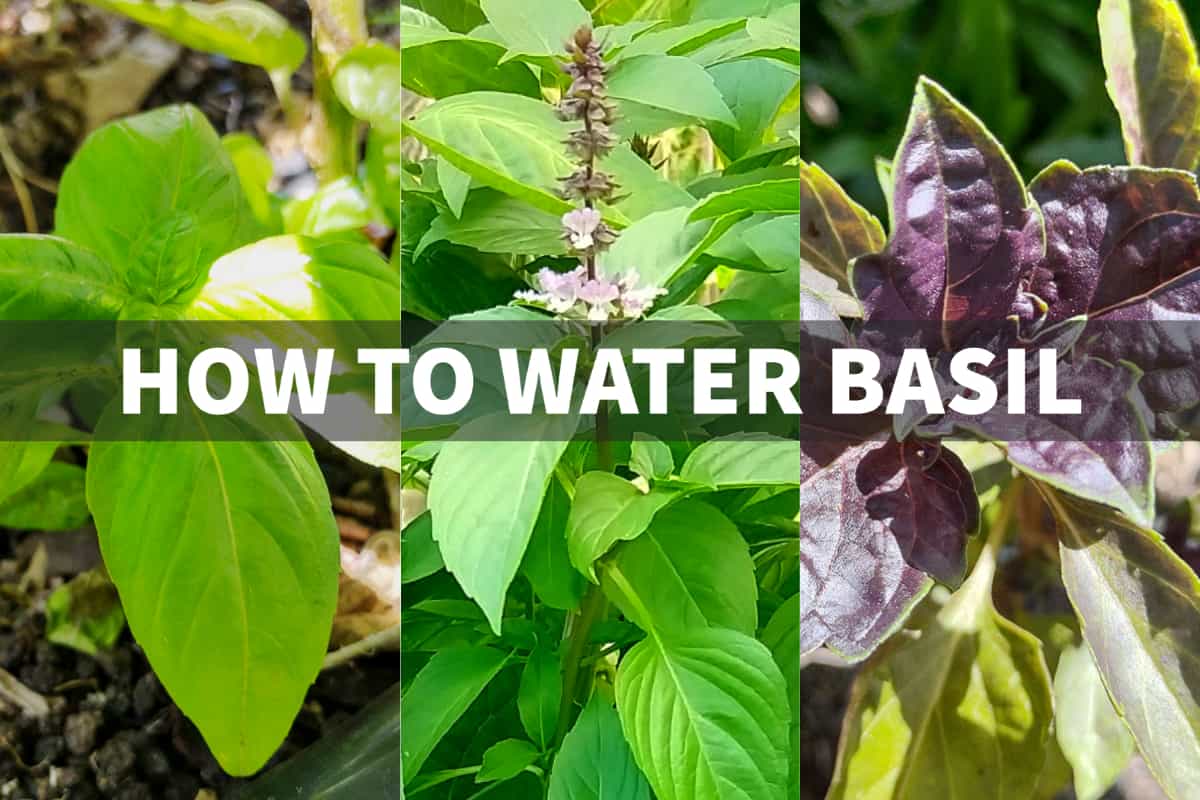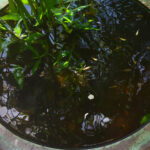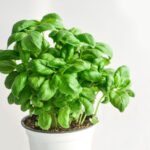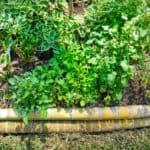This post may contain affiliate links.
How often to water a basil plant depends on many factors. Is the plant small or large and bushy with lush green leaves? Is it in a small pot and is that pot plastic or permeable like terracotta? Is the plant in good soil, rich in organic matter, or is the soil poor and hydrophobic? Is your basil plant indoors or outdoors? What species of basil is it? There are many types of basil with different habits. Is the plant in full sun, indoors, or shaded? Also what time of year is it? Heat and wind will dry plants faster than cool wet conditions.

This post covers how often to water a basil plant and other useful information on homegrown basil for indoors, or outdoors.
Should You Grow Basil Indoors or Outside?
This will depend on your climate, your available space, the time of year, and your personal preference.
Most species of basil don’t like cold weather and certainly don’t like frost. In tropical regions, you can grow some types of basil in winter. In cooler climates, you may be able to keep basil alive indoors on a sunny windowsill in the cooler months.
A greenhouse or cold frame may also extent your growing season in cooler climates.
Here in the tropics we grow some types of basil year-round. But not all, I have difficulty with European or sweet basil in the winter months.
This winter I’ll try sweet basil in the best possible soil, full of worm compost, and hope it does better.
Basil is a very good edible plant to grow indoors on a sunny windowsill, just allow adequate water and light, a grow light would be helpful, you can buy these for individual pots, cheaply, on Amazon here. I own this grow light, it really helps my plants.
Pots Will Affect How Often You Have to Water Basil

If your chosen pot is porous or permeable to water in any way, you will need to water more often. Permeable types of pots include terracotta and woven growing bags.
Permeable pots, particularly in full sun, can dry out very fast. Depending on the time of year, weather conditions, and the number of plants in the pot, you’re likely to have to water every day or even twice a day.
Here in the tropics most of my plants get watered around dawn and after sun down. I never water in full sun as tender basil leaves are easy to scorch that way.
A non porous pot, such as plastic or glazed ceramic, will need less frequent watering.
Your Basil’s Soil Will Affect How Often You Have To Water
Rich soil, full of good compost and well broken down organic matter acts like a sponge and holds water longer than very sandy, dusty, or clay soil.
Some bagged, bought composts can be very poor quality. If your growing medium looks like barely-rotted sticks, your basil likely won’t do well.
You can improve your soil greatly by adding organic material such as homemade compost, well-rotted manure, worm castings or vermicompost, and some, good-quality, bought composts.
To increase the amount of time your soil holds water you can also add certain additives to your soil, such as water retention crystals or vermiculite.
- buy vermiculite here
- buy water retention crystals here
As well as being rich, your soil for growing basil needs to drain well. Basil doesn’t like growing in a swamp. In the garden, this could mean building your soil up from ground level, or using a raised bed to improve drainage.
In the tropics we almost always build our beds up so that our plants don’t get flooded in the wet season.
You could also grow basil plants in hanging baskets. If so, be ready to water often.
Do You Need to Mulch Basil Plants?
Mulching almost always helps plants to grow because it helps water retention, maintains a more even temperature in the soil, and shades it from harsh sun, rain, and wind.
Mulching also helps your soil micro-organisms to flourish, this will help your plants grow.
Basil plants are mostly quite tender, so don’t pile mulch against their stems, this could cause rotting.
As you’re likely to eat your basil, be certain your mulch is food-safe. I tend to mulch herbs with chop-and-drop from, for instance, pigeon pea plants, or fallen leaves.
We’ve had much better success growing herbs in the tropics with pots, raised beds, or garden beds, that are mulched.
When To Water Basil
Water basil when it needs watering. Basil needs to be watered before the soil completely dries out and before it wilts badly. A slight wilt is normal and natural if heat is intense but a strong wilt can kill your basil plant.
Aim to keep the soil moist, never saturated and soggy. The easiest way to know when a basil plant needs watering is to stick your finger into the soil.
If you can feel moisture an inch or so down, it should be OK. If the soil is dried out to finger depth, water it! This could be every day, every two days, twice a day or once a week. The frequency of watering depends on all the factors above and giving a fixed watering routine is ridiculous.
A Small Basil Plant Will Need Less Water Than a Large One.
If you have 2 basil plants side by side, in identical pots, with identical soil, and standing in identical conditions, the small plant will lose less water than the large plant and require watering less often.
This is because basil plants draw up water from the soil through their roots, it rises through the plant and evaporates from the leaves as part of the transpiration process. Leaves have pores or stomata to allow this.
This is why a plant with lots of leaves needs more watering than a small one.








